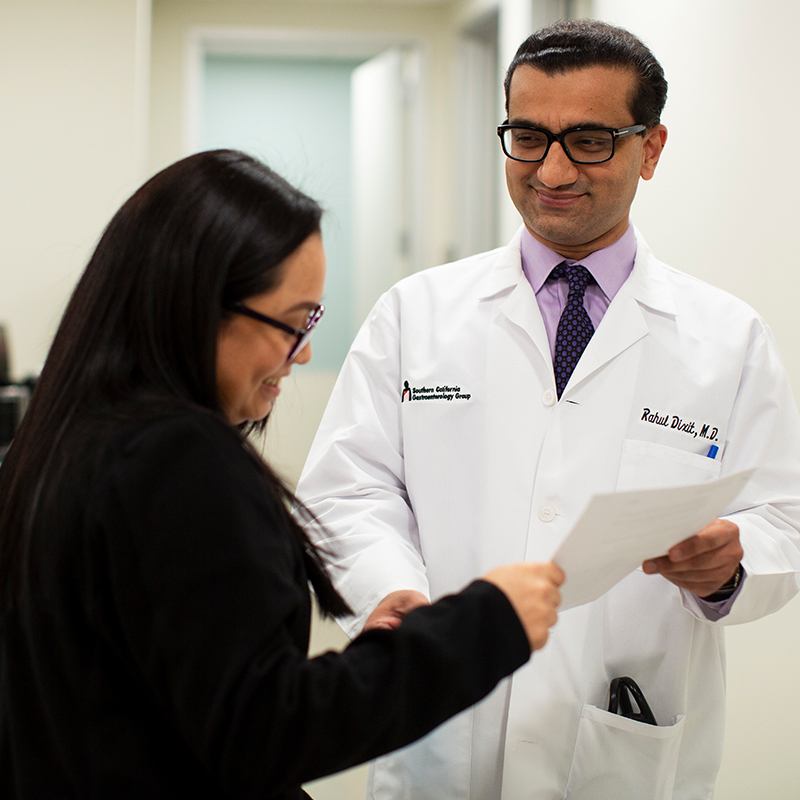Endoscopic Ultrasound

overview
Endoscopic Ultrasound
Endoscopic ultrasound (EUS) is a minimally invasive procedure used to find the cause of symptoms such as abdominal or chest pain, to assess digestive diseases and evaluate findings from other tests such as CT scan or MRI. During the procedure a special endoscope uses high-frequency sound waves to produce detailed images of the lining and the walls of your digestive tract as well as nearby organs. An EUS can be done to evaluate both the upper digestive track as well as the lower intestines.
This procedure can also be used to obtain tissue samples with a thin needle, and guided by the ultrasound, from enlarged lymph nodes or suspicious tumors. This is called fine needle aspiration (FNA). EUS is typically performed on an outpatient basis and is safe and well tolerated by most people.
You may not be a candidate for EUS if you have had abdominal surgery that changed your anatomy, such as Roux-en-Y gastric bypass.
Why is an Endoscopic Ultrasound Done?
Some conditions where an EUS can be helpful include evaluations of:
- Cancer of the colon, esophagus, lung, pancreas, stomach and rectal cancers.
- Lymphoma
- Barrett’s esophagus
- Bile duct stones
- Pancreatitis and pancreatic cysts
- Neuroendocrine tumors
- The extent or stage of the cancer, if present
- Determining If cancer has spread to your lymph nodes or other organs
- Permit precise targeting for delivering medication directly into the pancreas, liver and other organs.
Risks
Endoscopic Ultrasound Potential Risks and Complications
Like other endoscopic procedure EUS is safe and well tolerated. Your doctor will discuss the potential risks from an EUS procedure which may include.
- Bleeding
- Infection
- Tearing along the track of insertion or perforation
- Pancreatitis, if FNA of pancreas is done

Prep
Preparing for an Endoscopic Ultrasound
You will receive specific instructions to prepare for your EUS from your doctor. These may include:
Fast before the procedure
eating nothing for at least six hours before beginning the procedure.
Stop certain medications
Stop certain medications including blood thinners. Your doctor will review your prescriptions and over-the-counter medications with you.
Arrange transportation
EUS is done under sedation so be sure to arrange for someone to drive you home after the procedure.
What to Expect
What to Expect During an Endoscopic Ultrasound
- You will receive anesthesia and depending on the type, you may be mildly sedated or completely asleep.
- While you’re under sedation, your gastroenterologist passes a thin, flexible tube (endoscope) through your mouth and through your digestive tract. The small ultrasound device produces sound waves to create precise images of surrounding tissue, including the lymph nodes.
- If you have a FNA during your EUS, your doctor guides a very slender needle through the channel of the endoscope to extract fluids and tissue for analysis.
- The procedure may take 30 to 90 minutes depending on the complexity and whether you have FNA.
After the procedure you will be taken to the recovery room. Once you’re fully awake, your doctor will discuss the findings of the procedure. When your blood pressure, pulse and breathing are stable and you’re alert, you will be discharged. Be sure to have someone drive you home, as you may still be drowsy from the anesthesia.
You can typically go back to your normal activities and diet, unless told otherwise by your doctor. Your doctor will give you specific instructions based on your situation.
Although complications are uncommon, you should immediately call your doctor if you have the following symptoms after your procedure:
- Fever
- Chest pain
- Shortness of breath
- Black, tarry stools
- Severe and persistent abdominal pain
You will be given specific instructions for follow up by your physician after the procedure
Specialists

